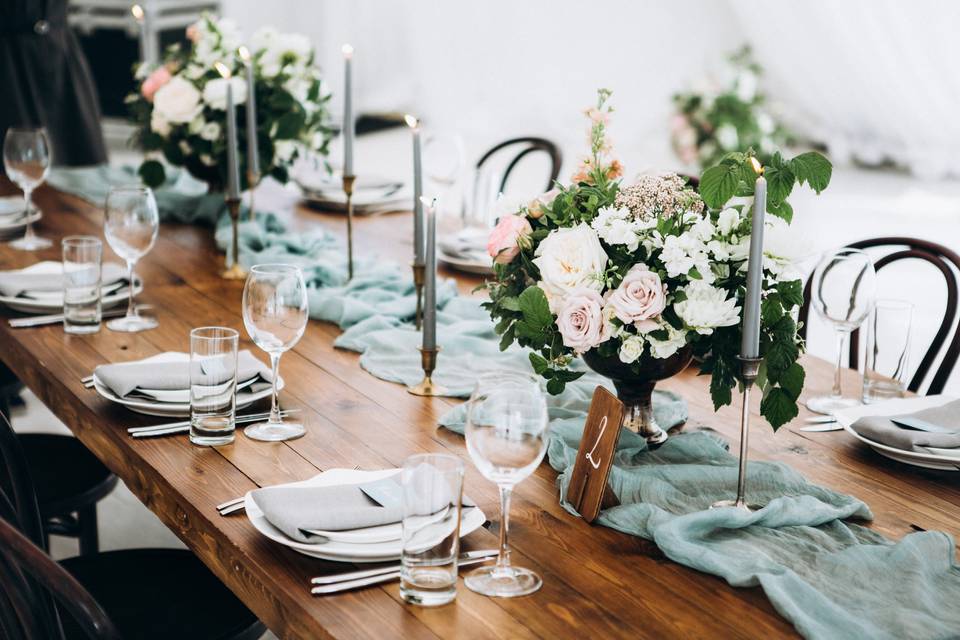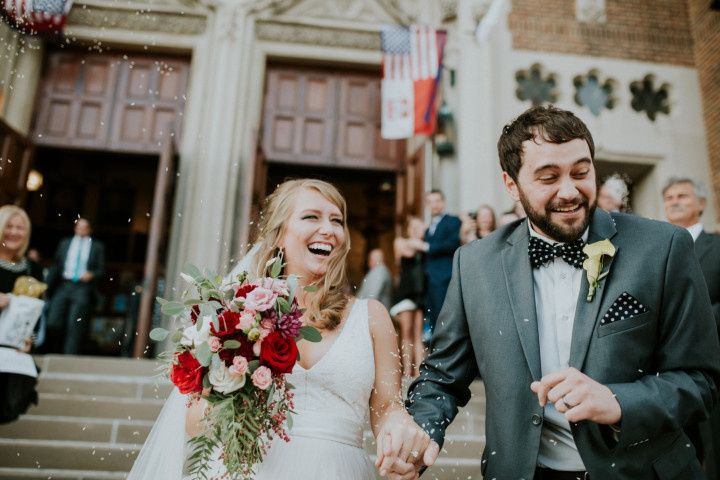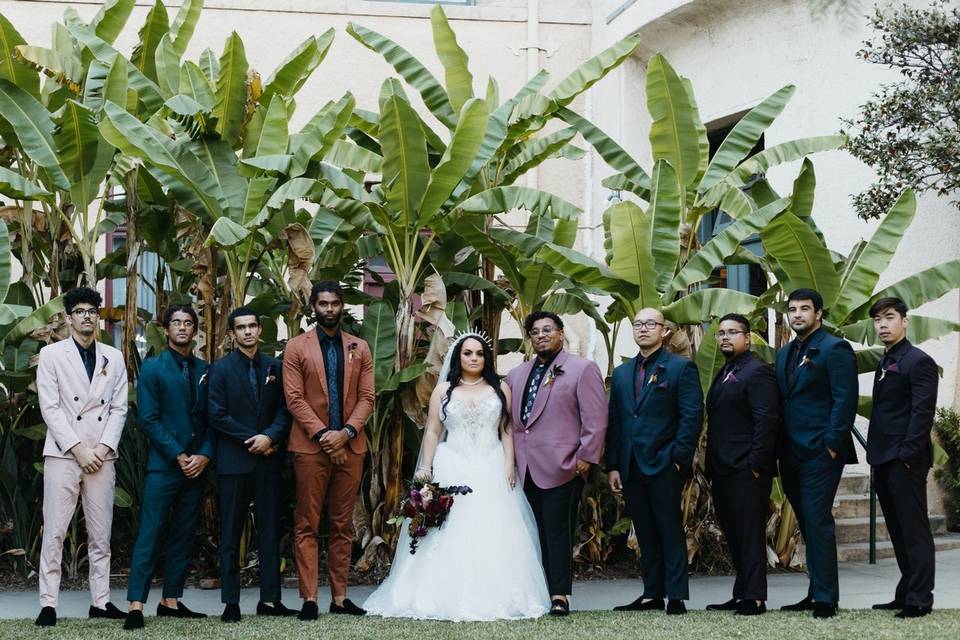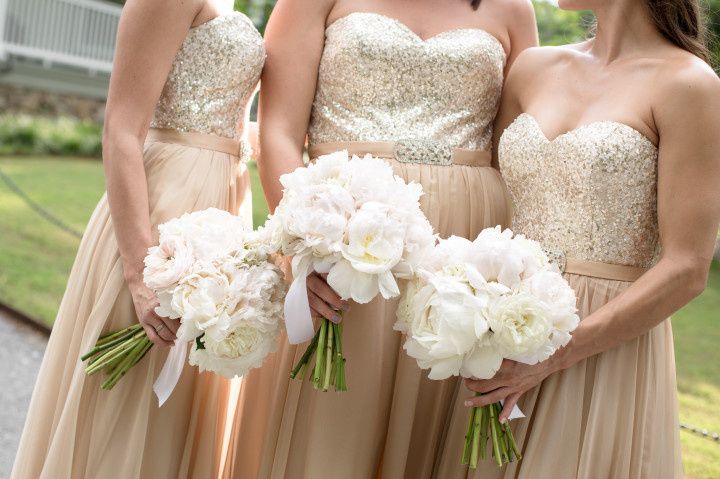Average Wedding Budget vs. Reality: How to Avoid the Overspending Trap
What’s the difference between a couple’s initial wedding budget and what they actually spend on their big day? A lot, it turns out.


One of the first questions you'll likely ask as you start to plan your big day is, "Okay, so how much does a wedding cost?" Well, it's complicated. It turns out that there's quite a discrepancy between how much couples plan to spend on their wedding (the average wedding budget) vs. how much they actually spend. In fact, according to the new Behind the Wedding Budget study from WeddingWire and Grow by Acorns + CNBC, 68% of couples admit that their initial wedding budget was set lower than what it realistically should have been. We're here to break down the difference between an average wedding budget (a.k.a. what you think you'll spend) and what couples should realistically expect to spend—and how to avoid this discrepancy during your own planning process.
Average Wedding Budget vs. Actual Wedding Spend
On average, a couple sets aside about $22,500 for their wedding. Seems like a reasonable amount, right? Well, it turns out that the average cost of a wedding in the U.S. is closer to $30,000—which is a pretty big discrepancy. And remember, that the $30,000 figure is only an average and weddings in your chosen location may cost more or less than this figure. In particular, if you tie the knot in a major metropolitan area—New York City, for example—you'll likely pay closer to $50k! Destination weddings tend to cost slightly more than hometown events, especially when you factor in travel costs.
Another important factor in your wedding's cost is your guest list. The more people you invite, the more you'll spend on your wedding ceremony and reception. If saving money is important to you, your best bet is to plan a small wedding. And that includes your wedding party members—each bridesmaid, groomsman, groomslady, or bridesman will incur expenses such as bouquets, boutonnieres, gifts, and more—and those certainly can add up!
How can we create a realistic wedding budget?
For newly engaged couples, 44% say figuring out and/or managing their budget has been the most challenging part of planning so far. So how can you avoid spending more than you initially intended? Your goal should be to create an accurate budget upfront, rather than simply guess how much a wedding costs and risk overspending. Here's how to get started:
Find out how much a wedding costs in your area.
For some reason, people feel uncomfortable talking about how much a wedding costs—but it shouldn't be taboo! According to the Grow x WeddingWire study, more than half of respondents had no idea about a wedding's actual price tag early on in their planning process, which makes setting a budget a nearly impossible task! We know it may be uncomfortable to talk to friends and family members about wedding expenses, so there are online resources that can help: WeddingWire's Cost Guide provides the average cost of a wedding in your location so you can set a realistic budget and avoid sticker shock as you start incurring those expenses.
Research wedding vendors before budgeting.
While we always recommend couples set their wedding budget early in the planning process, many couples are taking this step too early. Yes, coming up with that total dollar amount you have to spend is essential, but you'll also need to be able to divide it up to pay for each wedding product or service. That means knowing the average price for each wedding vendor you're planning on hiring. According to the Grow x WeddingWire study, 75% of couples set a budget before conducting any research on the cost of vendors—a trap that's easy to fall into. From wedding venues to officiants, wedding planners to caterers, photographers, florists, and more, each vendor has an important role to play, and you'll want to know what each pro costs so you can more accurately set your budget.
Decide who's paying—and start an open dialogue.
While about one in four couples pay for their entire wedding themselves, for many couples, asking for financial support from family is common (here's the traditional "who pays for what" breakdown, if you're interested). According to the Grow x WeddingWire study, 72% of couples receive some financial support when it comes to paying for their wedding, mostly from parents.
If any loved ones are contributing to your wedding, it can be easy to simply say "thank you" and avoid asking the tough questions—like exactly how much they're able to spend on your big day. While this may be a somewhat awkward conversation, it's an important one. According to our study, most family contributors provide the couple with a set dollar amount regardless of the total cost of the wedding—and you'll want to know what that number is.
Remember, too, that with financial involvement comes some control over the wedding details. While, according to our study, 82% of couples are thankful for their parents' involvement, there are likely some strings attached. Of those couples, one in three feel an obligation to listen to their parents’ input on the big day, and one in five face points of contention with their parents during the planning process. To help combat any tension, talk to your parents or other contributors in advance to decide which parts of the wedding they'll be involved in.
Have the "splurge vs. save" conversation with your partner early on.
One of the most important steps to creating your wedding budget is figuring out what your priorities are—and it's different for every couple. Perhaps you want over-the-top centerpieces, a designer wedding dress or tuxedo, or a show-stopping wedding cake, but your partner wants to spend more on videography and a live band. Time for a compromise! You and your future spouse will need to narrow down your list to two or three areas of your wedding where you're willing to splurge. In fact, according to the study, one in three couples say they are willing to spend more on the one or two things they really want, and that they’d be willing to increase their budget to accommodate it. If you don't discuss this in advance (and put it in writing!), you may end up splurging in many different areas and going over-budget.
Curious as to the areas that couples prioritize? According to our study, self-identifying females typically prioritize photography (86%) and venue (81%), while self-identifying males typically prioritize catering (58%).
Expect the unexpected.
Wedding planning isn't always the most straightforward journey (just ask anyone who planned a wedding during the COVID pandemic!), and it's not uncommon for unexpected costs to pop up. In fact, 58% of couples in our survey said that they were concerned about incurring these additional costs during the planning process. However, if you've done your research, these expenses should be few and far between. A few examples: The marriage license, and tips and gratuities, which most couples forget about until a few weeks before their wedding day. By factoring these into your budget earlier in the planning process, they won't be as much of a shock to the system when the time comes.
Figure out how you'll pay for everything.
Particularly if you and your partner are paying for all or part of your own wedding yourselves, you'll want to decide how you'll be footing the bill. Will you be paying from your savings account, checking account, cash, or with a credit card—or will it vary from vendor to vendor? According to our study, 66% of couples paid for wedding expenses from a savings account, 55% paid from a checking account, 54% paid with cash. And 30% of couples used an existing credit card, while 6% opened a new credit card account to pay for wedding expenses. Keeping close tabs on these bank accounts will ensure you don't overdraw and can pay off any credit card debt sooner rather than later.
Keep your personal finances and financial goals in mind.
Remember that after your wedding, you and your partner will be newlyweds with your own financial goals, whether it's buying a house, paying off student loans and/or credit card debt, or even taking a major trip or honeymoon. While it can be difficult to balance it all, it is possible. Remember that your initial wedding budget should be based on your current financial situation, factoring in your monthly expenses and other payments. While you might be able to earn additional money during the planning by, say, taking on extra shifts at work, don't factor that into your initial budget until the extra funds are in your bank account.
Don't fall into the DIY trap.
Many couples try to DIY many items, like wedding invitations and favors, because it seems like a great money-saving move. And while yes, sometimes that's the case, remember that there are actual costs involved. And we're not just talking about purchasing the supplies (which can cost more you think!). DIY projects can take up a great deal of your time and energy. And if you're not a skilled crafter, you might not be thrilled with the end result, leaving you scrambling to find a (perhaps expensive) replacement. Our advice? If you want to take on one DIY project for your wedding, go for it—but leave the majority of the work to the pros.
Use an online wedding budget tool.
There are many ways to keep track of your wedding spending throughout the planning process—from spreadsheets to taking pen to paper. Our recommendation? Try WeddingWire's online wedding budget tool, which helps you monitor your costs so you don't overspend. An online tool is particularly ideal because multiple people can access it (unlike an Excel spreadsheet or handwritten budget) and it does a lot of the legwork for you in terms of divvying up your budget for different vendors and sending reminders when payments are due.





